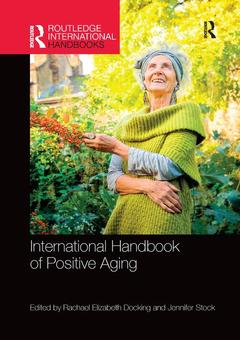International Handbook of Positive Aging Routledge International Handbooks Series
Coordonnateurs : Docking Rachael E., Stock Jennifer

As our global demographic shifts towards an increasingly aging population, we have an opportunity to transform how we experience and think about getting older and embrace the diversity and contribution that this population can bring to society. The International Handbook of Positive Aging showcases the latest research and theory into aging, examining the various challenges faced by older adults and the ways in which we can bring a much-needed positive focus towards dealing with these.
The handbook brings together disparate research from medical, academic, economic and social community fields, with contributions from NHS partners, service users, universities across the United Kingdom and collaborations with international research leaders in the field of aging. Divided into sections, the first part of the book focuses on introducing the concept of positive aging before going on to cover the body over the life course, well-being and care delivery. All contributors recognise the fact that we are living longer, which is providing us with a tremendous opportunity to enjoy and flourish in healthy and fulfilling later lives, and this focus on the importance of patient empowerment is integral to the book.
This is a valuable reference source for those working in developmental psychology, clinical psychology, mental health, health sciences, medicine, neuropsychological rehabilitation, sociology, anthropology, social policy and social work. It will help encourage researchers, professionals and policymakers to make the most of opportunities and innovations to promote a person?s sense of independence, dignity, well-being, good health and participation in society as they get older.
Part I: Introduction to positive aging 1. Introduction 2. What is positive aging? 3. Epidemiology and aging 4. Positive aging, positive dying: intersectional and daily communicational issues surrounding palliative and end-of-life care services in minority groups in the United Kingdom and the United States Part II: The body over the life course 5. Cancer 6. Heart failure 7. Exploring experiences of aging with Type 2 Diabetes (T2D): the case for a whole-system approach 8. Dementia 9. Falls 10. Pain management and assessment Part III: Well-being 11. Physical activity and healthy eating 12. Sexual health for older adults 13. Cognitive aging 14. Environment, housing, health, and social care 15. Social lives, social engagement, and work 16. Digital technologies and aging Part IV: Care delivery 17. Quality of life of elderly residents of UK care homes: a systematic review 18. Advance care planning for older adults at the end of life Part V: Conclusions 19. Conclusion
Dr Rachael E. Docking is Senior Evidence Manager at the Centre for Ageing Better and Research Fellow at Anglia Ruskin University. Her research background is in the disciplines of psychology and epidemiology. Rachael’s specific interests are in attitudes to aging, chronic and/or disabling pain in older adults, risk factors for pain onset and methods for self-management of pain. Additionally, she has an interest in dementia and pain, particularly in how accurately pain can be assessed in those with dementia. In her work at the Centre for Ageing Better, an independent charitable foundation working to help everybody enjoy a good later life, Rachael leads their programme on ‘Homes and neighbourhoods’. As Senior Evidence Manager she works on their evidence work stream and identifying evidence needs.
Dr Jennifer Stock was a Senior Research Fellow at Anglia Ruskin University at the time of submission. Jennifer’s background is in psychology and she has lead on a number of aging-related research projects. Jennifer’s doctoral thesis investigated the role of psychosocial factors in the relationship between physical activity and cognitive ability in older adults. Jennifer’s post-doctoral research interests have included psychological resilience with aging, improving attitudes towards aging amongst young people and healthcare staff, dementia, lifestyle interventions, innovative use of technology to improve the lives of older adults, psychosocial aspects to living with long-term conditions, and end-of-life care. Jennifer is currently undertaking her doctorate in Clinical Psychology at the Institute of Psychiatry, Psychology and Neuroscience, Kings College London.
Date de parution : 12-2019
17.4x24.6 cm
Date de parution : 06-2017
17.4x24.6 cm
Thème d’International Handbook of Positive Aging :
Mots-clés :
Geriatric Oncology; Prospective Memory; Positive Aging; Chronic Obstructive Pulmonary Disease; gerontology; Advanced Care Planning; Centre for Positive Ageing; Dementia Care Mapping; University of Greenwich; Smart Homes Technologies; cognitive ageing; pain management; Vascular Dementia; dementia; Falls Risk Assessment; well-being; Fundamental Human Desire; digital technologies and ageing; DFCs; daily life and ageing; ACP Discussion; life course; Age UK; epidemiology of ageing; Future Housing Options; cancer; Co-morbid Health Conditions; policy development for ageing; Assistive Technology; ageing support; Alzheimer’s Disease; healthy behaviour; Primary Healthcare Services; care delivery; Physical Health Outcomes; Jennifer Stock; HFNS; Pat Schofield; EoL Option; John Foster; Geriatric Principles; Carlos Moreno-Leguizamon; Heart Failure Patients; David Smith; Physical Activity Behaviour Change Intervention; Clarence Spigner; Smart Homes; Michelle Lycke; Lies Pottel; Tom Boterberg; Supriya G; Mohile; Etienne Brain; Philip R; Debruyne; Sarah Barnes; Katharine Whittingham; Paul Newton; Koula Asimakopoulou; Mustafa Al-Haboubi; Sasha Scambler; Joanne Brooke; Leslie Gelling; Trevor Thompson; M; Elena Mendoza; Rachel Crockett; Tatiana Christides; Geraldine Anthony; Nelson A; Roque; Walter R; Boot; Jill Stewart; Ann Pascoe; Elaine Wiersma; Hilde Verbeek; Eshtar Hamid; Joanna Malone; Liz Bacon; Professor Lachlan MacKinnon; Elizabeth West; Pauline McGovern; Val Chandler; Jane Banaszak-Holl; David Barron; Gary Bellamy



